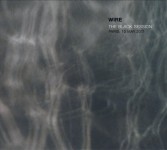|
|
 |
Dusted Reviews
Artist: Wire Album: The Black Session - Paris, 10 May 2011 Label: Pink Flag Review date: Feb. 7, 2012 |

|
|
|
 |
Wire’s first live LP, Document And Eyewitness, was an antagonistic artifact of a band about to implode. Much of it was taken from a gig staged just after the end of the English quartet’s sojourn with EMI, which had yielded the immortal triptych of Pink Flag, Chairs Missing, and 154. They were tired of being themselves and in no mood for label-courting; instead they staged a mock cabaret complete with crowd-baiting MC and uncommercial new songs, then posthumously released a grimily recorded record of the proceedings in 1981 as a fuck you fare-thee-well. The Scottish Play, Wire’s second live album, came out 24 years later. It’s a definitive record of an astonishingly ferocious re-embrace of punk energy and sound shaped but not filtered by nearly 30 years of experience; it was a phase that the band was ready to put to bed. Guitarist Bruce Gilbert left shortly afterwards.
The Black Session is less definitive, but no less true. In recent years, Wire have taken to marketing their history via digital-only releases of old concerts, some for general release, some subscription-only; probably good for their pocketbooks, a boon for obsessive fans, but it sort of erodes the role of the live album as a way of marking the band’s changes. This one makes no attempt at grand statements. It is a very accurate document of Wire’s 2011 live set; its strengths and weak spots correspond exactly to the ones of the concert they played in Chicago the same year. The current incarnation, which adds touring guitarist Matt Simms to surviving/recording members Colin Newman, Graham Lewis, and Robert Grey (formerly Robert Gotobed, which remains my all-time favorite punk rock name), takes its cues from the last studio album, Red Barked Tree.
Throughout the ‘70s and ‘80s, Wire’s records charted relentless (if occasionally misguided – anyone played Manscape recently?) progress, and while the early aughts releases reached back to the biting, texturally skewed punk of 1978’s Chairs Missing, they elaborated that approach in ways that wouldn’t have been possible back in the day. Red Barked Tree was the first Wire album to frankly revisit the band’s different phases; “Clay” echoes the hook of “I Am The Fly,” “Please Take” buoys its sarcasm with the same bubbly, mid-’80s sheen as “Kidney Bingos,” and “Smash” strikes a balance between the Pink Flag and Send eras. Aside from the title song, an anomalous piece of environmental protest music, it’s the work of a group consolidating its position, not expanding it.
All of those tunes save “Fly” are on The Black Session, and the rest of the 13-song set touches on high points of Wire’s discography through the years in a legacy-mindful fashion that gives the fans what they want. “Comet” reasserts ownership of Send‘s feral aggression, and thanks to Simms’ encyclopedic sonic resources, they turn in credible versions of a couple songs from the massively studio-fied 154. It takes a while for the band to hit their stride; the strained and off-mic vocals on “Please Take” and opener “Adapt” are reminders that Wire’s always pulled things off on record that they had trouble doing live. But once they hit it, they ride it like old master surfers whose slightest shifts of weight and stance keep them upright on waves that upend all the young pups. And the pacing is perfect. “Kidney Bingos” is as bright and sparkly as a blown bubble, “Moreover” as implacable as a pit bull on a mission from God, “Down To This” ruefully reflective; each is right where it needs to be.
If there was one thing I really missed when Wire re-charged c. Send, it was “Drill.” It was the high point of their ‘80s edition, the first song they released post-reunion and the last song they played live before Grey left. Back then each performance of “Drill” was an improvisational deconstruction of rhythm, unstoppably propulsive but quite unpredictable; here it is manageably dimensioned, but still satisfyingly white-knuckled. The album closes with an eleven-minute long, feedback-soaked version of “Pink Flag.” I imagine that the mercilessly succinct Wire of 1977 might have been aghast at its unabashed rock heroics, which are as gloriously excessive as Yo La Tengo in freak-out mode. But they’re able to stand aside and critique themselves in action; right at the point where the song disappears into a ship-swallowing maelstrom, Lewis steps up to the mic and plays an incongruously perky tune on his smart phone. It’s as if he’s taking everyone else to task for their unseemly display, never mind how much he contributed to it just moments before.
By Bill Meyer
|







